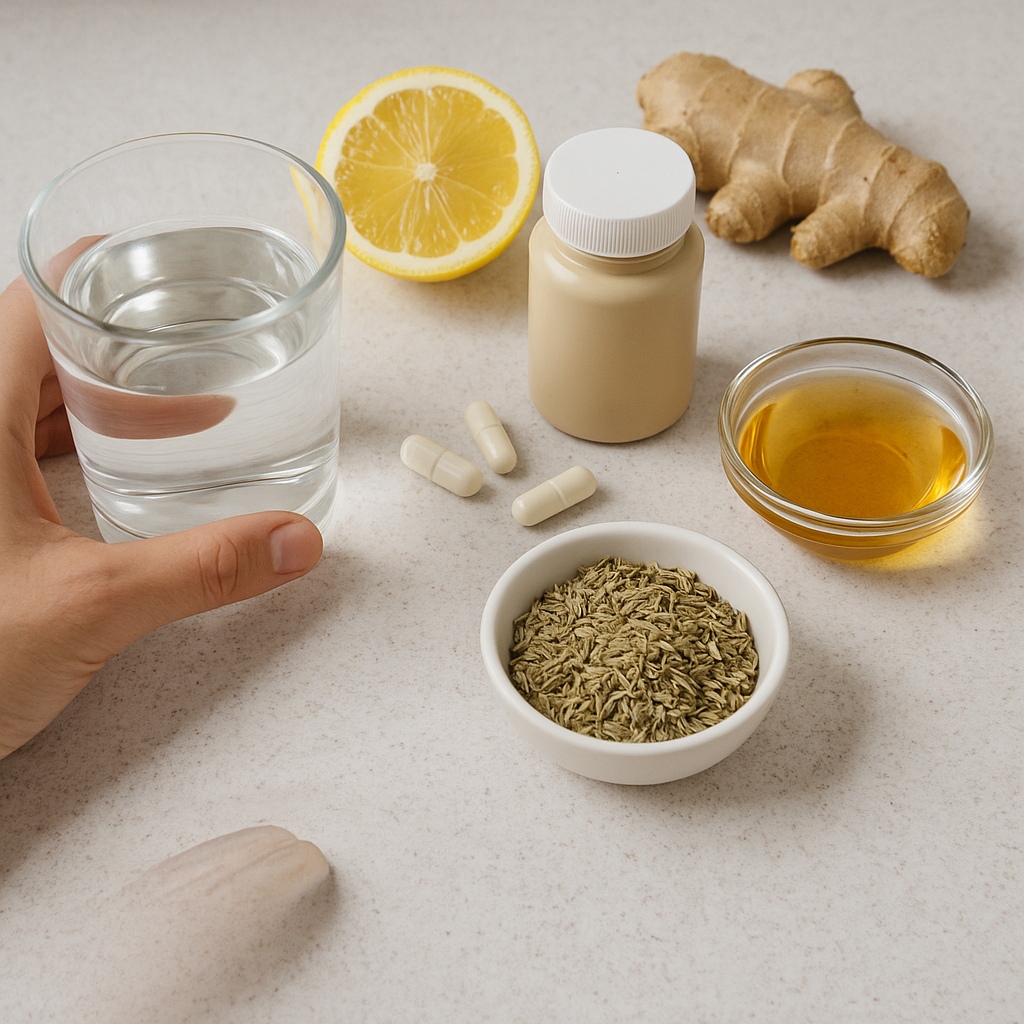How to Get Rid of Bloating: Ayurvedic Tips for a Calm, Flat Belly

Let’s just say it—bloating sucks. Whether it’s that tight, puffed-up feeling after a heavy meal or waking up with a mysteriously swollen belly (despite eating clean the day before), it can ruin your day. And if you’ve been Googling how to get rid of bloating for the tenth time this week, you’re not alone. The struggle is weirdly universal.
The good news? You don’t have to rely on antacids or chalky pills every time your gut goes rogue. Ayurveda—India’s ancient science of life—has a surprisingly practical, grounded approach to digestive issues. From balancing your digestive fire (agni) to sipping herbal tea for digestion, there are natural tools that actually work. This isn’t about six-pack abs or #flatstomachgoals—it’s about feeling good in your body. That said… a calmer gut often does lead to a flatter belly. Bonus.

What Causes Bloating?
Before you dive into the remedies, it's good to understand what you're actually dealing with. Bloating isn’t just about gas (though, yeah, that’s part of it). It can be about your nervous system, your daily habits, and even how you think about food.
Poor Digestion and Food Triggers
Let’s not sugarcoat this: a lot of us eat like we’re in a rush. Cold smoothies in winter, random snacking, heavy late-night dinners—these choices confuse your digestion. According to Ayurveda, poor food combining or eating on-the-go can weaken agni, the inner digestive fire that breaks down food. And when digestion is sluggish? You get gas, heaviness, and yes—bloating.
Certain culprits are classic: beans, dairy, processed carbs, cruciferous veggies like broccoli, and artificial sweeteners. These aren’t “bad” foods, but they can become troublemakers when your digestion’s off.
Gut Imbalance and Stress
Ever noticed how bloating hits hardest before a big meeting? Or after an argument? That’s not coincidence. Stress messes with the gut big time. In fact, your brain and gut are constantly talking—when one is anxious, the other reacts.
Stress can cause imbalances in your gut bacteria (hello, dysbiosis), slow down digestion, and increase inflammation. If you’re constantly feeling puffy, despite eating healthy, this might be why.
Also, let’s not ignore chronic issues like IBS, food intolerances, or hormonal shifts. They can all play a role in persistent bloating. Ayurveda doesn't claim to "cure" these things—but it can support your body’s healing.

Don't wait or self medicate. Start chat with Doctor NOW
How to Get Rid of Bloating Fast
Now for the part everyone’s really here for: what actually helps when you feel like you swallowed a balloon?
Effective Home and Herbal Remedies
Some of the best bloating remedies are surprisingly simple. Start with warm water. Sip it slowly, especially first thing in the morning. It gently stokes agni and flushes out excess gas.
Try chewing a mix of fennel, cumin, and ajwain seeds after meals. Or boil them together to make a digestive tea. Honestly, this is a game-changer. Not glamorous, but super effective.
Peppermint oil capsules, ginger tea, or a bit of hing (asafoetida) in your cooking can also reduce belly gas almost instantly. These are time-tested tools—not internet hacks.
Simple Diet Swaps
Okay, look. No one’s saying you need to go full monk mode with your meals. But if you want to actually reduce bloating and get that light, spacious feeling back in your belly, a few intentional food swaps can make all the difference.
First, ditch the cold stuff. I know iced lattes and raw salads feel “clean,” but they can put out your digestive fire (agni) like a bucket of water. Ayurveda recommends warm, cooked foods, especially when your digestion is off. Think soups, lightly spiced lentils, sautéed veggies—not cold smoothies or protein bars straight from the fridge.
Second: simplify. Instead of cramming 12 ingredients into every meal (looking at you, rainbow Buddha bowls), try eating mono-meals—just rice and veggies, or dal and rice. Less complexity = easier digestion = less bloating.
Also, keep an eye on food combining. Ayurveda has strong opinions here—fruit with dairy, beans with cheese, or yogurt with fish? Big no. These combos create "ama" (toxins) and lead to bloating. Even if it sounds old-school, test it for a week and see how your gut responds.

Ayurvedic Approach to Bloating
Modern solutions can feel like a band-aid—pop a pill, move on. Ayurveda takes a slower, deeper route. It asks: why is your digestion weak? Where is the imbalance? Let’s fix that, not just the symptom.
Agni (Digestive Fire) and Bloating
Everything in Ayurveda revolves around agni—your internal fire. When agni burns bright, digestion is strong, and bloating doesn’t stand a chance. But when it’s weak or “dampened” by stress, cold food, or irregular eating? That’s when gas builds up, food sits heavy, and things just feel...off.
To strengthen agni, start small. Sip warm ginger tea before meals. Don’t snack constantly—give your belly 3–4 hours between meals to reset. Sit down when you eat (crazy how often we don’t). Even a short walk after lunch helps stoke the fire.
Best Herbs and Teas
Now, the fun part: Ayurvedic herbs for bloating are powerful, natural, and (mostly) easy to find.
-
Triphala: This classic blend of three fruits helps cleanse the gut and regulate elimination. Take it before bed with warm water.
-
Cumin-Fennel-Coriander Tea: This simple infusion helps calm the gut and support agni. Bonus: it’s caffeine-free and super gentle.
-
Ajwain (carom seeds): Strong, spicy, and amazing for gas. A pinch with salt and warm water is an old Indian remedy that works like magic.
-
Hing (asafoetida): Smells funky, but trust me—your gut will love it. A tiny bit in your cooking or mixed with ghee can knock out bloating fast.
Also worth trying: licorice root for calming inflammation, and tulsi (holy basil) for stress-related gut issues. Ayurveda’s got a whole pharmacy of natural digestion tips, but these are a great place to start.
Daily Habits to Prevent Bloating
Let’s be honest—this is where most of us drop the ball. We might chug ginger tea for a day or two, but long-term gut calm? That’s built with habits. Tiny, consistent ones.
Eating Practices and Posture
Here’s the big one: slow. down. when. you. eat. I don’t mean meditate over every bite (unless that’s your thing), but try not to scroll TikTok or argue politics mid-lunch. Eat sitting down, chew well, and don’t multitask. Your digestive system isn’t built for chaos.
Also, posture matters more than you'd think. Slouching right after eating compresses your abdominal organs—so yeah, the gas builds up. Try sitting cross-legged, or take a gentle walk for 10–15 minutes. In Ayurveda, this is called “Shatapavali”—literally, “100 steps after eating.”
And avoid drinking a ton of water during meals. A few sips? Fine. But flooding your stomach dilutes your agni. Wait 30 minutes after eating if you can.
Calming the Nervous System
So many bloating issues aren’t about what you eat, but how your body is reacting. If your nervous system is in fight-or-flight mode, digestion shuts down. Literally.
Breathing slowly before meals, doing a few minutes of alternate nostril breathing (nadi shodhana), or even just lighting a candle while you eat—these tiny rituals can put your body into “rest-and-digest” mode. Which is where you want to be.
Some folks swear by abhyanga—self-massage with warm oil—as a nervous system soother. Sounds indulgent, but it helps. Especially if your bloating gets worse when you’re anxious.
When to Worry About Bloating
Sometimes bloating is more than just a meal gone wrong. It can be a sign that something deeper needs attention.
Chronic Bloating and Serious Causes
If bloating is happening daily, especially with weight changes, fatigue, or bowel issues—you might want to dig deeper. Conditions like SIBO, celiac disease, endometriosis, or gut infections can masquerade as “just bloating.” Don’t self-diagnose forever. Ayurveda can support you, but persistent symptoms deserve a closer look.
When to Consult a Doctor
Quick rule of thumb: if bloating comes with pain, vomiting, bleeding, or you’re losing weight without trying—please, go see a doctor. Don’t just “herb” your way through it.
Ayurveda is powerful, but it's not a substitute for medical care. It can be an amazing complement though—especially when guided by someone who understands both systems.
Conclusion
So, how to get rid of bloating? There’s no magic bullet. But between bloating remedies, ayurvedic herbs for bloating, gentle daily rituals, and awareness of stress, you can absolutely start to feel lighter—physically and emotionally.
It’s not about fixing your belly overnight. It’s about reconnecting with your gut in a way that feels kind, intelligent, and sustainable.
Trust your body. It’s trying to talk to you. Sometimes, it just needs you to listen with a little more warmth.
FAQs
What foods cause bloating the most?
Dairy, beans, cruciferous veggies (like broccoli), fried foods, carbonated drinks, and artificial sweeteners are common culprits. Cold and raw foods can also bloat you if digestion is weak.
Which Ayurvedic herbs help with bloating?
Triphala, fennel, ajwain, cumin, coriander, and hing are top choices. Each supports digestion in a different way.
Can stress and anxiety trigger bloating?
Absolutely. When you're stressed, digestion slows down. This can lead to gas buildup, bloating, and discomfort. Calming your nervous system can help reduce symptoms.
How fast can natural remedies relieve gas?
It varies. Warm herbal teas and spice blends can work in 15–30 minutes. But lasting relief usually comes from consistent habits.
Got any more questions?
Ask Ayurvedic doctor a question and get a consultation online on the problem of your concern in a free or paid mode.
More than 2,000 experienced doctors work and wait for your questions on our site and help users to solve their health problems every day.

